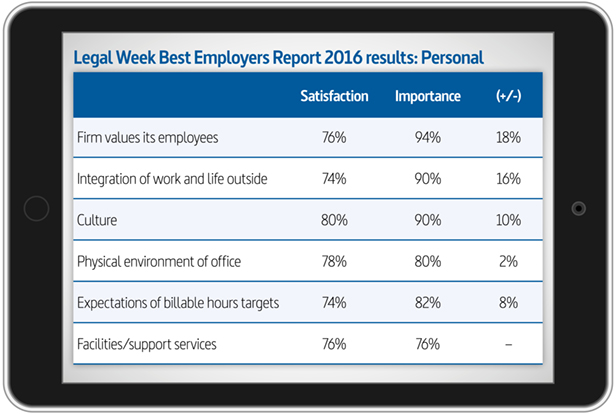The new demands young lawyers are placing on their employers
2,300 lawyers surveyed; diversity, flexibility and communication highlighted as key concerns
September 26, 2016 at 12:00 AM
8 minute read
As the UK legal services market consolidates its post-crisis recovery, the competition for talent is intensifying, putting ever more pressure on law firms to attract and retain the best young lawyers.
So how successful are law firms at making young lawyers feel valued? To find out, the Legal Week Intelligence Best Employers Report – now in its 13th year – canvassed the views of more than 2,300 fee earners across a spread of UK, City and international firms.
Respondents were asked to rate multiple aspects of their professional working lives, both in importance and satisfaction. And young lawyers make demands. High expectations in many areas proliferate, with several categories scoring very highly for importance, notably: being valued by the firm (94%), prospects for career development (92%), quality of work handled by the firm (92%) and salary (92%).
Best Employers 2016: law firm profiles
- 'Everybody knows each other' – Best Employers 2016: Withers
- 'Open, honest and hard working' – Best Employers 2016: Clarke Willmott
- 'We employ people who meet and match our values' – Best Employers 2016: Shoosmiths
- 'Nice people, nice place to work' – Best Employers 2016: Ashfords
- 'People are encouraged to be themselves' – Best Employers 2016: RPC
- 'Friendly but focused' – Best Employers 2016: Trowers & Hamlins
- 'People have the opportunity to grow' – Best Employers 2016: Burges Salmon
As the highest rated category, being 'valued' can sometimes be falsely equated with remuneration; instead, there are other factors at play, not least courtesy, respect and recognition. However, few respondents feel motivated to comment positively, even if most (76%) are satisfied.
In contrast, the dissatisfied minority is more vocal, with comments such as "trainees are not valued at all", "we need less spin, more honesty" and "I want to be treated more like a valued member of staff rather than a small cog in a law machine".
"Feeling valued often has very little to do with money," suggests Simon Luckett, global HR director at Withers. "You've got to make sure you are financially competitive but the way you feel valued is the interaction you get from the work that you do, both from the partners you work for, but also the clients that you are interacting with."
Salary and bonuses still provide the highest disparity between importance and satisfaction of any criteria: 24% and 28% respectively. As the remuneration at some big firms has jumped significantly during the past year, fuelled by a surge in the salaries offered by several leading Wall Street firms, the increasing divide between what the elite international players can offer and the rest has not gone unnoticed by survey respondents. This increased stratification is creating multiple layers in the legal market, with mid-sized firms finding it hard to remain competitive.
 "We don't pay top dollar – but nor do we tie you here for every hour under the sun just because we want to see your jacket on the back of the chair," says Louise Hadland, HR director at Shoosmiths (pictured).
"We don't pay top dollar – but nor do we tie you here for every hour under the sun just because we want to see your jacket on the back of the chair," says Louise Hadland, HR director at Shoosmiths (pictured).
"The market has moved," explains Paul Robinson, head of HR at Trowers & Hamlins. "We can't compete with the salary levels of the magic circle and we're not trying to, but we still have healthy salary levels. The nature of the work that we do and the work/life balance that people get are important factors too."
But there are some areas of tangible improvement, with the survey revealing that satisfaction with career development and partnership prospects is significantly up on last year – by 15% and 23% respectively.
Among those who feel that they have a cause to complain, much criticism relates to communication. "Law firms are not great at communication generally," says Luckett. "They're not great at communicating in terms of people's career prospects. Partners sometimes feel challenged having those sorts of conversations." Rachel Street, director of people and talent development at RPC, suggests: "The more that people have open conversations, the simpler it becomes to ask questions around career opportunities."
The integration of work and life outside continues to show a divide between importance and satisfaction: 90% vs 74%. But the disparity has reduced by half from a 30% gap last year.
"There has been a gradual shift in attitudes among our partners around flexible working," says Street. "Flexibility is something that should be open to all." Robinson concurs: "We've already got quite a significant amount of flexible working, formal and informal, in place."
Hadland suggests: "Culture and communication are very important, as is consistency of application. You can't blow hot and cold with people; you have to be consistent in your treatment of them. You have to be joined up, so that one person, in one team, in one office, sees and feels the same treatment as somebody in another, which is pretty hard to do, but we work very hard at it."
Of the different criteria examined by the survey, diversity ranks joint bottom, with only 74% of respondents regarding it as important. Exactly the same percentage are satisfied. With a zero mismatch between the two, diversity might not therefore seem to be a big concern.
However, the comments section reveals significant dissatisfaction. "The people promoted to partner are very 'alpha male'," says one respondent. For others, it is a burning issue. "There is complete and utter lack of interest in improving diversity, despite all the chat to the contrary," says one respondent. Another says: "There is a lack of diversity in trainees – I wish the firm would recognise the existence of other types of candidates, rather than the carbon copies they currently recruit."
Sixty-seven percent of respondents to the survey were female, reinforcing the point that law firms do not have a problem attracting female lawyers – the issue lies in providing long-term promotion prospects for women. Ken Bryant, head of HR at Ashfords, outlines his firm's gender breakdown: "Around 75% of our associates are female. Legal directors and senior associates, around 50% are female; at partnership level, it's around 25%."
Every firm interviewed for the survey report speaks eloquently about their strong endeavours to achieve greater female representation at a senior level. But ethnic diversity presents a more complex challenge: one that shows most law firms as laggards rather than leaders. Among survey respondents, Asian (5.5%), black (2%), mixed race (2%) and other (0.5%) give a combined black and minority ethnic (BME) figure of 10%. Set against the 2011 census figure of 14% BME in the total UK population, this may not look too bad.
But study the figures for the UK population aged under 35, the graduate statistics produced by UCAS/Sutton Trust and the UK secondary school data from the Department of Education, and the BME figures exceed 30% on every benchmark. Take London in isolation, and all three figures are in excess of 50%. In this context, a figure of only one in 10 BME associates at law firms does not look good at all.
One way to address the problem is the use of social mobility initiatives designed to attract a broader intake. Burges Salmon has taken on five legal apprentices as part of the Trailblazers programme, which started in May: "These are school leavers who will be doing their apprenticeship with us, with a view ultimately to qualify as a lawyer with a degree," says chief people officer Robert Halton. The firm received more than 100 applicants per place. Ashfords is also taking on 10 apprentices this year: "We respond to the fact that not everyone wants to go to university," says Bryant.
The broader client response is perhaps best summarised by Louise Pentland, general counsel (GC) at PayPal, and formerly GC at Nokia, who speaks for many of her counterparts in large multinationals: "If you look at the women and ethnic minorities who advance to partnership, the numbers are pathetic. We choose law firms that emulate our company's values, especially diversity and inclusion. Some firms are addressing the issue and some firms are telling me that they're trying to. But all the big law firms have an incredible way to go."
To be kept informed of developments for the 2017 report and to find out how you can get involved click here.
For more information on the Best Employers Report, please contact Lara Rosenthal on +44 (0)20 3868 7545 or email [email protected]
Click here to read profiles of the Best Employers on the BER content hub.
NOT FOR REPRINT
© 2025 ALM Global, LLC, All Rights Reserved. Request academic re-use from www.copyright.com. All other uses, submit a request to [email protected]. For more information visit Asset & Logo Licensing.
You Might Like
View All
Is KPMG’s Arizona ABS Strategy a Turning Point in U.S. Law? What London’s Experience Reveals
5 minute read
KPMG Moves to Provide Legal Services in the US—Now All Eyes Are on Its Big Four Peers

International Arbitration: Key Developments of 2024 and Emerging Trends for 2025
4 minute read
The Quiet Revolution: Private Equity’s Calculated Push Into Law Firms
5 minute readTrending Stories
Who Got The Work
J. Brugh Lower of Gibbons has entered an appearance for industrial equipment supplier Devco Corporation in a pending trademark infringement lawsuit. The suit, accusing the defendant of selling knock-off Graco products, was filed Dec. 18 in New Jersey District Court by Rivkin Radler on behalf of Graco Inc. and Graco Minnesota. The case, assigned to U.S. District Judge Zahid N. Quraishi, is 3:24-cv-11294, Graco Inc. et al v. Devco Corporation.
Who Got The Work
Rebecca Maller-Stein and Kent A. Yalowitz of Arnold & Porter Kaye Scholer have entered their appearances for Hanaco Venture Capital and its executives, Lior Prosor and David Frankel, in a pending securities lawsuit. The action, filed on Dec. 24 in New York Southern District Court by Zell, Aron & Co. on behalf of Goldeneye Advisors, accuses the defendants of negligently and fraudulently managing the plaintiff's $1 million investment. The case, assigned to U.S. District Judge Vernon S. Broderick, is 1:24-cv-09918, Goldeneye Advisors, LLC v. Hanaco Venture Capital, Ltd. et al.
Who Got The Work
Attorneys from A&O Shearman has stepped in as defense counsel for Toronto-Dominion Bank and other defendants in a pending securities class action. The suit, filed Dec. 11 in New York Southern District Court by Bleichmar Fonti & Auld, accuses the defendants of concealing the bank's 'pervasive' deficiencies in regards to its compliance with the Bank Secrecy Act and the quality of its anti-money laundering controls. The case, assigned to U.S. District Judge Arun Subramanian, is 1:24-cv-09445, Gonzalez v. The Toronto-Dominion Bank et al.
Who Got The Work
Crown Castle International, a Pennsylvania company providing shared communications infrastructure, has turned to Luke D. Wolf of Gordon Rees Scully Mansukhani to fend off a pending breach-of-contract lawsuit. The court action, filed Nov. 25 in Michigan Eastern District Court by Hooper Hathaway PC on behalf of The Town Residences LLC, accuses Crown Castle of failing to transfer approximately $30,000 in utility payments from T-Mobile in breach of a roof-top lease and assignment agreement. The case, assigned to U.S. District Judge Susan K. Declercq, is 2:24-cv-13131, The Town Residences LLC v. T-Mobile US, Inc. et al.
Who Got The Work
Wilfred P. Coronato and Daniel M. Schwartz of McCarter & English have stepped in as defense counsel to Electrolux Home Products Inc. in a pending product liability lawsuit. The court action, filed Nov. 26 in New York Eastern District Court by Poulos Lopiccolo PC and Nagel Rice LLP on behalf of David Stern, alleges that the defendant's refrigerators’ drawers and shelving repeatedly break and fall apart within months after purchase. The case, assigned to U.S. District Judge Joan M. Azrack, is 2:24-cv-08204, Stern v. Electrolux Home Products, Inc.
Featured Firms
Law Offices of Gary Martin Hays & Associates, P.C.
(470) 294-1674
Law Offices of Mark E. Salomone
(857) 444-6468
Smith & Hassler
(713) 739-1250












